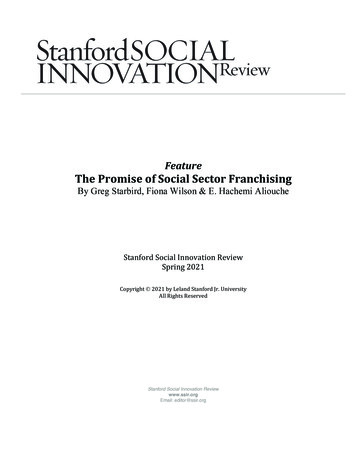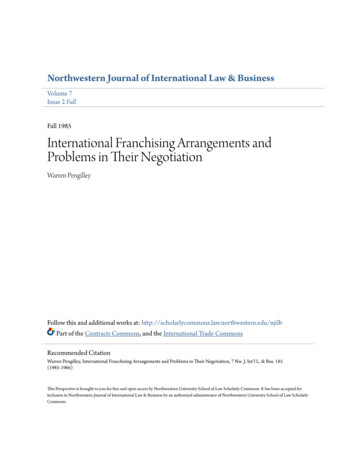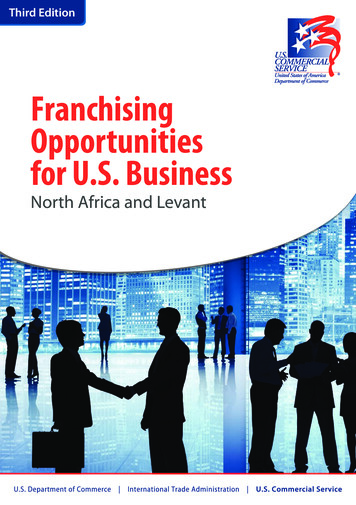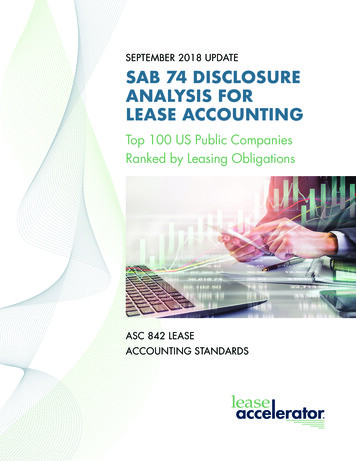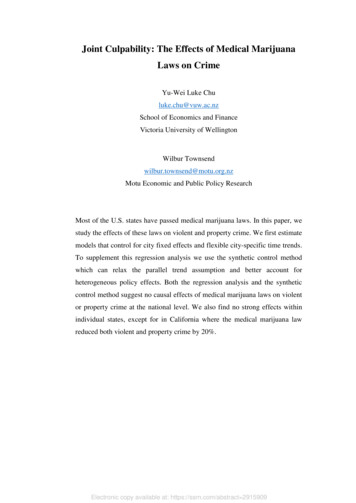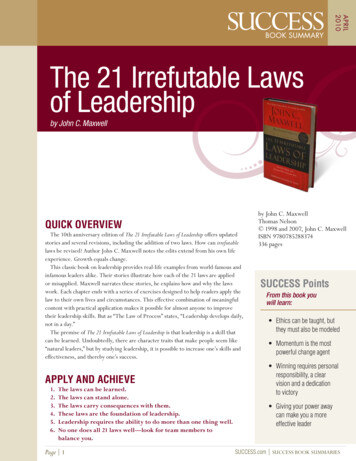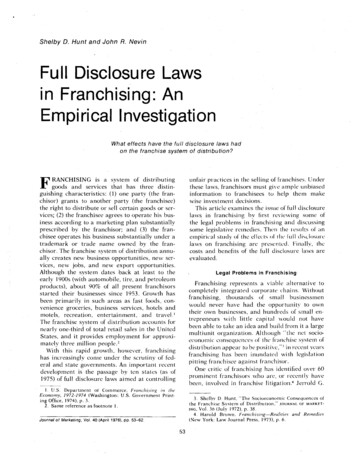
Transcription
Shelby D. Hunt and John R. NevinFull Disclosure Lawsin Franchising: AnEmpirical InvestigationWhat effects have the full disclosure laws hadon the franchise system of distribution?Funfair practices in the selling offranchises. Underthese laws, franchisors must give ample unbiasedinformation to li-anchisees to help them makewise investment decisions.This article examines the issue of full disclosurelaws. in franchising by first reviewing some ofthe legal problems in franchising and discussingsome legislative remedies. Then the results of anempirical studythe effects oltiJe lull di, .iosul'elaws on franchising are presented. Finallv, thecosts and benefits of the full disclosure laws areevaluated.RANCHISING is a system of distributinggoods and services that has three distin guishing characteristics: (I) one party (the fran chisor) grants to another party (the franchisee)the right to distribute or sell certain goods or ser vices; (2) the franchisee agrees to operate his bus iness according to a marketing plan substantiallyprescribed by the franchisor; and (3) the fran chisee operates his business substantially under atrademark or trade name owned by the fran chisor. The franchise system of distribution annu ally creates new business opportunities, new ser vices, new jobs, and new export opportunities.Although the system dates back at least to theearly 1900s (with au tomobile, tire, and petroleumproducts), about 90% of all present franchisorsstarted their businesses since 1953. Growth hasbeen primarily in such areas as fast foods, con venience groceries, business services. hotels andmotels, recreation. entertainment. and travel. IThe franchise system of distribution accounts fornearly one-third of total retail sales in the UnitedStates. and it provides employment for approxi mately three million peoplc. 2With this rapid growth. however, franchisinghas increasingly come under the scrutiny of fed eral and state governments. An important recentdevelopment is the passage by ten states (as of1975) of full disclosure laws aimed at controllingorLegal Problems in FranchisingFranchising represents a viable alternative tocompletelv integrated corporate chains. Withoutfranchising, thousands of small businessmenwould never have had the opportunitv to owntheir own businesses. and hundreds of small en trepreneurs with little capital would not havebeen able to take an idea and build from it a largemultiunit organization. Although "the net socio economic consequences of the FI',lI1chise system ofdistribution appear to be positivc."J ill recent yearsfranchising has been inundated with k'gislationpitting franchisee against franchisOl'.One critic of ft-anchising has identified over 60prominent franchisors who are, or recent Iy havebeen. involved in franchise Iitigation,4 Jerrold G.1 u.s. Department ot Commerce, Franchisil1g i'1 theEconomy, 1972-1974 (Washington: U.S. Government Print·ing Office. 1974). p. 3.2. Same reference as footnote I.3. Shelbv D. Hunt, "The Socioeconomic Consequences ofthe Franchis.e System of Distribu lion," JOURNAL OF MARKET ING. Vol. 36 (July 1972), p. 38.4. Harold Brown. Frallchismg-Reahties and Remedies(New York: Law Journal Press, 1973), p. 6.Journal of Marketing, Vol. 40 (April 1976), pp. 53-62.53
54Van Cise has noted that most of the litigation infranchising stems from three major t.ypes of de ceptive practices used by franchisors:' (1) decep tive practices in the granting or selling of thefranchise, (2) deceptive practices in the operationof the franchise,l; and (3) deceptive practices inthe tenninatioll of the franchise. To these must beadded the fourth legal problem of franchisors'imposing vertical territorial restraints on fran chisees. This article will focus on deceptive prac tices in the granting or selling of franchises.In 1970, the attorney general of New York de clared: "Thousands of people are being bilked ofhundreds of thousands of dollars by glib salesmenand misleading literature selling worthlessfranchises . . In almost every instcll1cc, thefranchise-offering literature was either inade quate, misleading, wholly lacking or blatantlyialse as to material facts necessary to make anintelligent investment decision:'7 Concluding that"fTanchising literally abounds with deceptive seIl ing practices," previous research by one of theauthors identified six deceptive practices that covermost of the major kinds of misrepresentation inselling franchises. s These practices include fran chisors' (1) misleading pl'Ospective franchiseesabout the potential pl'Ofitability of their franchises,(2) refusing to show actual profit and loss state ments to potential franchisees, (3) having "hiddencharges" j n the prices franch isees are charged for'services and supplies, (4) using a celebritv's name 10deceptively promote the franchise. (5) overpmmis ing on their aids to franchisees, and (6) lIsing high pressure tactics in closing the sale of a franchise.These deceptive practices have prompted the state5. Jerrold G. Van Cise. "The Boston College Center's Spe,cial Committee on Unfair and Deccptivc Practices in Fran chising. The Chairman's Final Report," ill Frallchi"ll//!,Today-1969, Charles 1. Vaughn. ed. (Ly'nbrook, N.Y.:Farnsworth Publishing Co . 1969), pp. 185,192.6. See Shelby D. Hunt and John R Nevin. "TyingAgreements in Franchising," JOURNAL OF MARKETING, Vol. 39(July 1975), pp. 20-26.7. Statement by New York Attornev General Ldkowitz toCommittee on Franchise Licensing of the New York Legisla,ture. September 21\, 1970. See "Staff Report in Franchisingto N,Y, Attornev General," January 7.1970.8. Shelby D,- Hunt. "Full Disc(osUI'c and the FranchiseSystelll of 'Distribution." in Dvnamic ; .Iarke/illl!: ill (I C"OII/!, 1l1g World, Boris W. BeckeT and Helmut Becker, eds.(Chicago: American Marketing Assn., 1973). pp. 301-304. ABOUT THE AUTHORSShelby D, Hunt is associate professor of business andchairman of the Marketing Department in theGraduate School of Business. University - ofWisconsin-Madison.John R. Nevin is assistant professor of business inthe Graduate School of Business. University ofWisconsin-MadisonJournal ofApril 1976legislatures, Congress, and the Federal TradeCommission to take action, Since 1970 aplethoraoflaws, nJ\es. and regulations ha\e been passed or arebeing considered.Legislative ActionsState laws regulating the franchise industry arepredominantly of the "full disclosure" variet\',aimed specificallv at unfair practices in the gmnt ing or selling of the franchise. Designed to protectprospective franchisees from misrepresentationsby franchisors. the laws require franchisors toprovide potential franchisees wi th suHicient u n . biased information to enahle them to make soundinvest ment decisions. Full disclosure laws havebeen passed (as of 1975) in the kgislatures ofCalifornia, Illinois. Hawaii, \1ichigan, Minnesota,Oregon, Rhode Island, South Dakota. Wash ington, Wisconsin, and the Province of Alberta,Canada.Most of the proposed and enacted statelcgisla tion on full disclosure closelv follmvs the Califor nia statute. which hecame operative on Januarv1, 1971,9 The general prmisions of the Californiamodel are:). Regulation of full disclosure for franchising is car ried out bv the state COllllllissjOIllT of securities.2. Franchisors must rellisll'J' a prospeclus \\lth till'OflIC{ oj S('{urilit's F\('lllpl('d film) iI}(' H'i'isll;\tioll 1'(-quirCllll'lll are 1;lIge tr:ullhis()Js(11eI\\()llhgn:atl.T than :; million) who 11;\\1.' had aminimum of 2 i franchises at all times during theprccedi ng rlve vears.3, A sample of the items that must be included in tilcprospectus are:a, Disclosure of the background of thl.· principabin\'oh'cd with Ihe fnHlchi or (cspl'l'ialh' al1\felonies cOllllllitted In' the principals)b. Recent financial statementc. Sample franchise contractd. Policy of thc franchisor conceming franchiserovalties, and suppliesc. Contract termination pl'OdsiotlsL Terms and conditions of am flnandal arrnngl"m('ntsg. Sllhsl Jnlialiul1 of anv pmlil projectiolls in I'IV/(wnw S1a tclllcnt-;h. Dis 'losures I'l:lating to \Ising Ihe naml' of a puh 1ic figureI. Number of franchises presenll\' operating amiproposed to hl' soldj. TerTitorial protection gl\cn to the franchisee4. All franchisors must show the preceding proSpl'C tus to all potential franchisees at least 48 hums9. Franchise Investment Law. Division 'i. Added toTitlc 4of the COI']Joration Cod" of Ihe State of C:difornia bv Slals.1970. Ch. 1400. operative on Janua!'\' I. 1971.
55Full Disclosure Laws in Franchising-- -------"-"'---"'---before signing the agreement (or receiving anyconsideration).5. All advertisements for franchisees must be regis tered with the commissioner at least three busi ness days prior to publication of the advertise ment.The California law has a limitation that mayseriously weaken its impact. While large com panies must give comparable information toprospective franchisees, they are exempt bothfrom the public filing of their offering circulars(the disclosure statements) and from registeringtheir advertisements. Brown has suggested thatperhaps for the first time in regulatory history."bigness is equated with honesty."10 The Wiscon sin Franchise Investment Law, in contrast. is notsubject to this potential limitation. It requiresthat even if a franchisor meets the registrationexemption requirements, to sell or offer a fran chise in Wisconsin' he must still file an applica tion and an offering circular with the commissionerof securities. Wisconsin's law also requires thatexempted franchisors file a copy of any advertis ing used in the state of Wisconsin. 11In the federal arena, two full disclosure mea sures were pending in the U.S. Senate as of 1975:S.3844 (The Franchise Full Disclosure Act) andS.2870. Although Senate Bill 3844 closely paral lels the California law, it is national in scope andwould require that all franchisors engaged in in terstate commerce register a uniform disclosureprospectus with the Securities and ExchangeCommission. Senate Bill 2870 is a modified ver sion of S.3844 that also includes a provision thatthe full disclosure requirements would bepreemptive and would thus supel-sede any incon sistent material in state legislation. Also pendingin the Federal Trade Commission is a trade regu lation rule that would likewise require full disclo sure. Of these three measures, passage of the FTCtrade regulation rule is the most likely.Research QuestionsThe present article will explore four researchquestions concerning the state full disclosurelaws: (1) To what extent are franchisors comply ing with the requirements of the full disclosurelaws? (2) How successful have the full disclosurelaws been in preventing franchisors from mislead ing prospective franchisees concerning the poten tial profitability of their franchises? (3) Howinfluential have the full disclosure laws been onthe investment decisions of prospective fran chisees? and (4) What effects have the full disclo sure laws had on the advertising and sales offranchises by franchisors?To obtain the information necessary to explorethese four research questions, two researchmethods were used: a mail survey of franchisorsand franchisees, and a before-after experimentaldesign that incorporated a nonrandomly selectedcontrol group. Three groups of franchisors wereincluded in the survey population: (I) all fran chisors registered in Wisconsin, (2) all franchisorswith an exempt status in Wisconsin, and (3) asystematic sample of franchisors listed in theFranchise Opportunity Hmulbook l1 who wereneither registered nor exempt in Wisconsin. Allfranchisees in Wisconsin who had purchased afranchise from either a registered or an exemptfranchisor since the Wisconsin Franchise Lawwas passed were also included in the sUl-veypopulation. Forty-eight pen:enl. of the 208 fran chisors in the survey population completed andreturned the mail questionnaire. The responserate for the 102 franchisees was 45%. The finalsample was composed of 102 franchisors (52registered, 19 exempt. and 31 nonregistered,nonexempt) and 45 franchisees (34 registered and11 exempt).The hefore-after cxperimenlnl desigll examinednewspaper advlTtising.(o dl'teITllim: the ci'lccts 01the full disclosure laws on franchisor cflorts tosolicit franchisees. The experimental group con sisted of a major newspaper from each of two fulldisclosure states: the Los Allgeles Times and theA.Jilwau.kec JUlimal. The control group consisted ofa major newspaper from each of two non-full disclosure states: the Chiwgo Tribtwe and the De unit News. The Sunday editions of these fournewspapers were used in measuring franchisoradvertising, because the largest number of clas sified ads appear on thai day and because fran chisors \vho advertised in the daily editions alsoadvertised in the Sunday editions.Effects of Full Disclosure Lawsin FranchisingExtent of ComplianceThe Wisconsin full disclosure law requires that:0) all franchisors (except certain large franchisorsthat are exempt) register a prospectus with theOffice of Securities before they can either advertiseor sell franchises in the state; and (2) registered10. Same reference as footnote 4. p. 257.II. Wisconsin Franchise Im'estment Law (Wise. Gcn·1.Laws. 'Chap. 553; Chap. 241 of the Laws of 1971), effectiveJuly I. 1972.12. U.S. Department of. Commerce. Fral1chise Oppm tunities Handbook (Washington: U.S. Government PrintingOffice, 1973).
56----------------- "-"Journal of Marketing, April 1976 "franchisors show potentiai franchisees a prospec tus, and exempt franchisors show potential fran chisees a disclosure statement, before any agree ments are signed. .The first research question asks: To 'what extentare franchisors complying with the reqllircJ11cnts ofthe full disclosure laws? The study found that al most one-fourth (7 of 31) of the nonregistered,nonexempt franchisors admitted to advertising forprospects in the state of Wisconsin and, therefore,were violating the law. Further, 21% (4 of 19) ofthe nonregistered, nonexempt franchisors who wereaware of Wisconsin's law admitted to advertisingin Wisconsin, and two of these franchisors evenadmitted to having sold franchises in Wisconsin.Therefore, some of the nonregistered, nonexemptfranchisors are admittedly not complying withthe full disclosure law in Wisconsin.Ninety-four percent (33 of 34) of the franchiseeswho purchased a franchise from a registeredfranchisor remembered being shown a prospec tus, while only 73% (8 of 11) of the franchiseeswho purchased a franchise from an exempt fran chisor remembered being shown a disclosurestatement. Registered franchisors' c;ompliancewi th the full disclosure law appears to be greaterthan that of exempt franchisors. However. thisconclusion must be tempered because personalinterviews in the exploratory phase of the re search revealed that some franchisees may havesimply forgotten that they were shown a p;:ospec tus or disclosure statement.Misleading Franchisees onPotential ProfitabilityPrevious research conducted prior to the pas sage of state full disclosure laws concluded that"many franchisors systematically mislead pro spective franchisees about the potential profitabil ity of their franchises."'3 This conclusion wasbased. in part, on the finding that 37% of thefranchisees in that study indicated that theirfranchisors had overestimated. and onlv 7% indi cated that they had underestimated. their poten tial profits during negotiations for the franchise.Thus. the second research question asks: HoII'successful have the fiill disclosure laws beel1 in pre venting fmllchisors from misleading prospectivefranchisees concerning the potential profItability oftheir fra11chises? The present results show thatonly 15% of the franchisees indicated that theirfranchisors had overestimated, and none indicatedthat they had underestimated, their potentialprofits during contract negotiations. Therefore.13. Same reference as footnote 8, p. 301,the full disclosure laws appear to have greatlyreduced the incidence of franchisors misleadingprospective franchisees concerning the potentialprofitability of their franchises. Nevertheless.there still seems to be some continuing misrep resentation in this area.Influence on Investment DeCisionsof Prospective FranchiseesThe full disclosure laws are designed to requirefranchisors to provide prospective franchiseeswith unbiased information to assist them in mak ing sound investment decisions. The third re search question asks: liow il1fllle11tial have the fz lldisclosure laws been il1 the investment decisiolls ofprospective franchisees? Only about one-fourth ofthe sample of franchisees indicated that some ofthe information on the prospectus greatlyinfluenced their decision to buy the franchise.Most franchisees did not perceive the prospectusto be of great value. Specific items reported to beof greatest value included: (1) the geographic areacovered by the franchise, (2) annual profit projec tion, (3) financing help, (4) costs of equipment. (5)officer background. (6) methods of operating andmerchandising policies. and (7) franchisee fees,royalties, and start-up costs. Franchisees differedconsiderably as to what information. if any, in theprospectus greatly influenced their decisions tobuy frallchisl'S,Adve'rtising and Sale ofFranchises by FranchisorsThe fourth research question asks: What L1fectshave the filll disclosllre laws had 011 the adt'cl1isil1gand sale of franchises by j'rclIlchisors? To investi gate the effects the full disclosure laws have hadon advertising. three more specific questions mustbe explored: (J) What effects have the full disclo sure laws had on the amount of advertising byfranchisors to solicit franchisees? (2) What effectshave the full disclosure laws had on the nature ofthe advertisements used by, franchisors to solicitfranchisees? and (3) What effects have the fulldisclosure laws had on the killds of fl'allc/Zisolswho adl'l'rtise for franchisees?Amo/l11.{ of Advertisillg. Full disclosure lawsmay discourage franchisors from offering fran chises in a state and, therefore, may reduce theamount of advel'tising for franchisees. Table 1shmvs the average number of franchisor ad\'er tisements for franchisees in each Sunday editionb ' year and quarter for each of the four' newspa pers. These figures sho\\' a substantial reduction inthe level of franchisor advertising in states aftertheir full disclosure laws went into effect. For
57Full Disclosure Laws inITABLEADVERTISEMENTS BY FRANCH'[SORS FOR FRANCHISEES IN THESUNDAY EDITIONS OF FOUR MAJOR NEWSPAPERSLos Angeles Times19711972.5.81.21973Chicago TrihwleDetroit Neil'sMilwaukee JournalAdsAdswIncome(':1,)AdsAdswIncome(%)AdsAds wIncome(7.2)( 1.5)(1.4)(I.4)15.412.52.52.1(16.2)( 16.8)5.24.82.3.5(44.2)( 7)6.65.81.41.6(21 .2)(27.6)19./ 18R5.03.6(19.1).6(4.3)(0.9)5.64.9.8.5(143)(l 0.2)8.26.]1.51.6( 3.9)(9.2)(6.7)5.36.26.64.0.7(132)1.6)( 1.5)(.0)735.03.9S.11.6.4(21.9)( 8.0)(12.8)( ( 129)9.21.1(12.0)AdswIncome"(%) 1.0(.5.81974(%)(2(12)(24.2)(25 3)Average number of advertisements by franchisors for franchisees in each Sunday edition.Average number of franchisors' ads with income representations in eaeh Sunday edition.r Percentage of fnmchisors' ads with income representations (ba) in each Sundav edition.d California's full disclosure law went into elIect after 4th quarter 1970 . Wisconsin's full disclosure law went into effect after 2nd quarter 1972.f Illinois' full disclosure law went into effect after 4th quarter 1973. The observation period for Illinois was c.xlcndl'll throlJgh1st Quarter 1974 to observe the immediate effects 01 the luw.ahexample. in the year preceding the effective dateof Wisconsin's full disclosure law, the MilwaukeeJournal averaged approximately thirteen fran chisor ads in each Sunday edition. However, thecomparable figure in the next year was only five.These reductions in franchisor advertising ap parently cannot be attributed to extraneous fac tors (for example, the state of the economy), sincea corresponding decrease was not evident in theDetroit News and Chicago Tribune, which servedas control papers. Similar results were observedin the Los Angeles Times after the California lawbecame effective, and seem to be taking place inthe Chicago Tribune since the passage of Illinois'law. The state full disclosure laws seem to m duce an immediate and perhaps permanent re duction in franchisor advertising activity.Nature of the Advertisements. As previouslymentioned. the full disclosure laws have ratherstringent provisions regarding advertising prac tices. The Wisconsin Franchise Law, for example,contains a section entitled "Standards of Adver tising," which states:No advertising shall make reference to . (ij)Projections of operations or of income from theoperation of any franchise unless based on pastcertified and audited financial statenH.'nts exceptduring the time preceding the first yearl" reportof operations of the franchisor.' . 14Advertising practice provisions like the abovemav discourage franchisors from using incomerep esentations in their advertisements. The termillcome representations refers to statements of ac tual dollar amounts of income and to extravagantclaims such as "guaranteed success."The average number and percentage of fran chisors' advertisements with income representa tions are also shown in Table I. The figures in uicate that the percentage of franchisors usingincome representations in their auvertisementsdramatically decreased in states after the passageof their full" disclosure laws. Especially nutablc isWisconsin, where approximately one-fifth of fran chisors' advertisements for franchisees in theMilwallkee. Journal had income representationsprior to the law, compared to virtually no adver tisements with income representations a year anda half after the law. These results would appear to14. Same refcrt'nce as footnote 11.
58Journal ofbe a consequence of the passage of full disclosurelaws because there were comparatively small de creases in income representations for the two con trol papers.In contrast to their advertising: practices inother states, franchisors began to deklt' incomerepresentations from their advertisements instates with full disclosure laws. To show the na ture of these deletions, the before-law and after law versions of two franchisors' advertisementsfor franchisees are illustrated in Table 2 Noticethat the "before-law" versions of both franchisors'advertisements contained income representationssuch as "Opportunity to earn 17,000 to 22,000Plus Per Year," "Increased profit year after year:'"You rick the income you want!" and " . oncein a lifetime opportunity." The income represen tations have been removed from the "after-law"versions of these advertisements.One surprising result shown in Table 1 is thatthe percentage of franchisors' advertisements inthe Los Angeles Times that contain income rep resentations suddenly increased to its prelawlevel in the third year after California's full dis closure law became effective. Similar increaseswere not observed in the Milwaukee loumal or ineither of the two control papers, the Detroit Newsand the Chicago Tribune.Two 'possible explanations are tentatively prof fered for this phenomenon. First. franchisors whostopped using income representations in their adsafter the full disclosure law became operativemay have been collecting the information re quired to substantiate their income representa tions. Hence, some franchisors may be againusing income representations in their Californiaadvertisements now that they have acquired thesubstantiating information. If this is the case,franchisors advertising in Wisconsin can be ex pected to start including income representationsin their advertisements in the near future.Another possible explanation might be that theprovisions of California's full disclosure law withrespect to franchisor advertising are less severeand less ardently administered than the provi sions of Wisconsin's full disclosure law. Wiscon sin's full disclosure law states that. no person may publish, distribute. or use inthis state any advertisement offering to sell or topurchase a franchise unless 2 true copies of theadvertisement have been fi It'd in the office of thecommissioner at least 5 days prior to the lirstpublication, distribution, or use thereof.l 15. Same reference as footnote 11, p. 15,California's law, by contrast, requires 0111ynonexempt franchisors to file a true copy of theadvertisement in the office of the commissioner atleast three business days prior to the first publica tion. Hence, exempt franchisors do /lot file a copyof their advertisements wi t11 the commissioner.Also, in Wisconsin the Of/ice of the Commissionerof Securities systematically reviews each fran chisor's advertisements and suggests changes inthe advertisements whenever an income rep resentation is made that cannot be substantiated.It is possible that California's full disclosure lawis not being as carefully administered as Wiscon sin's, so franchisOl's are once again starting to in clude unsubstantiated income representations intheir advertisements.Kinds of Franchisors Who Advertise. As part ofthe full disclosure provisions in Wist'onsin, fran chisors (except certain large franchisors) mustregister a prospectus and all of their advertise ments \-\lith the state commissioner of securities.Many small franchisors might not be able to af ford the legal fees and filing fees associated wi thregistering and, hence, might reduce their fran chising activity (and their advertising) in stateswith full disclosure Jaws.Two sources containing information on the sizeof franchisors were used in investigating whethersmaller, Jess financiallv seelln' frallchisors dt'·crease their atkerlisi Ilg reJati ve to larger {rall chisors in states with full disclosure laws. Thesesources were: (I) the Franchise Opportwzit, Hand book, which reports the number of franchises perfranchisor; and (2) Standard & Poor's Register ofCmporations, which reports annual sales per fran chisor. 16 Although there are many small fran chisors listed in the Franchise Opportllllitv Hal1d book, as a class they lend to be underrepresented.For example, in the fast-food restauranl categorythis publication lists 100 franchisors and only22% of them have ten or fewer franchises. Otherevidence indicates that over 60% of all restaurantfranchisors have ten or fewer franchisees. 17 Theunden-epresentatioll of small franchise systemscan probably be accounted for bv noting that rel atively new (hence, small) franchisors will not bein th Hal1dbook, and small franchisors in generalare less likely to be aware of the publication thanare large franchisors. Similarly. the normal pro 16. Same refere/Ke as [oolnote 12; and Register of Corpo ratiolls. Direct"'" tl'ld Executil'es (Ne\v York: Standard andPoor's, 1974),17. Urban B. Ol.anne and Shelbv D. Hunt. The EconomicEffects of Franchising (Washingtor , D.C.: U,S. Go\'ernmentPrinting Office, 1971).
59Full Disclosure Laws inTABLE 2FRANCHISOR ADVERTISEME TS BEFORE AND AFTER WrSCO SIN'SFULL DISCLOSURE LAW: Two ILLUSTRATIO SBefore-Law VersionAfter-Law VersionIllustration I-Ready AccessMay 7, 1972-Milwau/t:ee JournalNovember 12. 1912-Milwaukee JournalYou Can Own a BeautifulReady Access Food MartFor a Very Modest InvestmentYou Can Own a BeautifulReady Access Food MartFor a Very Modest InvestmentMake an appointment now to visit the beautifulReady Access Food Mart,Make an appointment now to visit the beautifulReady Access Food Mart.See these modern, attractive, convenient type gro cery stores in operation. Talk directly to the ownerswho took advantage 01 the opportunity to earn 17,000 to 22,000 Plus Per Year.See these modern. attractive, convenient type gro cery stores in operation. Talk directly to the ownerswho took advantage of the opportunity to earn.Previous experience not necessary because wetrain you and guide you all the way. Previous experience not necessary because wetrain you and guide you all the way .Future security. Increased profit year after year.Continuing growth in the value of your franchise.Modest cash investment required lor a brand newfood mart, air conditioned, completely stocked andready to go. Complete financing help available tothose who qualify. FranChised stores available nowin Oshkosh, Fond du Lac, Green Bay, and Milwau kee.Phone or write Bob CastleReady Access Food Marts ofSoutheastern Wisconsin7171 Summer St., Racine, WisconsinPhone: 632-8736 or 633-2357Ready AccessModest cash investment required for a brand newfood mart. air conditioned. completely stocked andready to go. Complete financing help available tothose who qualify. Franchised stores available nowin Oshkosh. Fond du Lac, Green Bay, and Milwau kee.Phone or write Bob CastleReady Access Food Marts ofSoutheastern WisconSin7111 Summer St., Racine, WisconsinPhone: 632-8736 or 633-2357Ready AccessIllustration 2-EverncatMarch 26. 1972-Milwaukee JournalJuly 30. 1972-Milwaukee JournalNeed a Second Income?ExistingEverneatCleaning StoresEverneatCleaning StoresExcellent way to supplement your family incomeor add to your pension. Your wife and daughter canoperate the store while you continue your job. In vest from 950 plus inventory and fixtures at cost.Larger volume stores also available. Liberal fi nanCing available.Excellent possibility of supplementing yourfamily income. Your wife and children can operatethe store wh ile you continue your job. Invest from 950 plus inventory and fixtures at cost. Many exist ing locations throughout Milwaukee.One of the following stores could be just rightfor you! These are only a few of the many loca tions availableAct today' Investigate this opportunity toown an operating store with known history of per f
the legal problems in franchising and discussing some legislative remedies. Then the results of an empirical study or the effects oltiJe lull di, .iosul'e laws on franchising are presented. Finallv, the costs and benefits of the full disclosure laws are evaluated. Legal Problems in Franchising .

